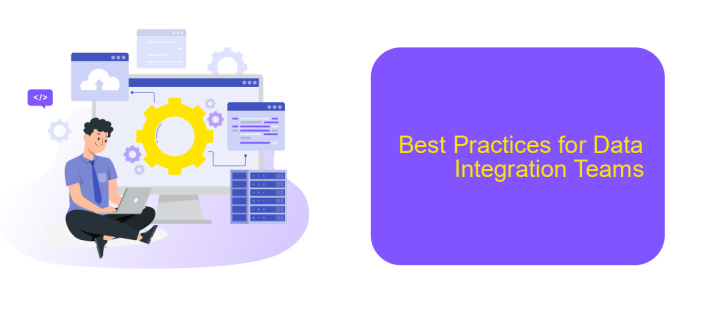Data Integration Team
The Data Integration Team plays a pivotal role in modern enterprises, ensuring seamless connectivity and data flow across various systems and platforms. By leveraging advanced technologies and best practices, the team enables real-time data access, enhances decision-making processes, and supports strategic business initiatives. Their expertise is crucial for maintaining data integrity and fostering a unified, efficient data ecosystem.
Purpose of a Data Integration Team
The purpose of a Data Integration Team is to ensure seamless connectivity and data flow between various systems within an organization. This team is responsible for consolidating data from disparate sources, transforming it into a unified format, and making it accessible for analysis and decision-making processes. By doing so, they enable businesses to gain comprehensive insights and enhance operational efficiency.
- Centralizing data from multiple sources
- Ensuring data quality and consistency
- Automating data workflows and processes
- Facilitating real-time data access
- Supporting data-driven decision-making
To achieve these goals, the Data Integration Team often utilizes specialized tools and services like ApiX-Drive. ApiX-Drive simplifies the integration process by providing a user-friendly platform to connect various applications and automate data transfers. This not only reduces the manual effort required but also minimizes errors, ensuring that data is accurate and up-to-date. Ultimately, the team's efforts lead to more informed business strategies and improved performance.
Benefits of a Data Integration Team

Having a dedicated Data Integration Team offers numerous benefits to an organization. One of the primary advantages is the seamless consolidation of data from various sources, ensuring that all departments have access to accurate and up-to-date information. This facilitates better decision-making, as teams can rely on a unified dataset rather than fragmented pieces of information. Additionally, a Data Integration Team can optimize data workflows, reducing redundancy and improving efficiency across the organization.
Another significant benefit is the ability to leverage advanced tools and services like ApiX-Drive, which streamline the integration process. ApiX-Drive allows for the automation of data transfers between different platforms, saving time and minimizing the risk of errors. This not only enhances productivity but also ensures that data is consistently synchronized across all systems. By utilizing such services, the Data Integration Team can focus on more strategic tasks, driving innovation and supporting the organization's overall goals.
Challenges of a Data Integration Team

Data integration teams face numerous challenges that can hinder their efficiency and effectiveness. These challenges often stem from the complexity of integrating diverse data sources and ensuring seamless data flow across systems.
- Data Quality Issues: Ensuring the accuracy, consistency, and reliability of data from multiple sources can be difficult.
- Data Security and Compliance: Protecting sensitive data and adhering to regulatory requirements is a constant concern.
- System Compatibility: Different systems and software may not always be compatible, leading to integration difficulties.
- Scalability: As data volumes grow, maintaining performance and managing increased loads becomes challenging.
- Resource Constraints: Limited time, budget, and skilled personnel can impede the integration process.
To overcome these challenges, teams can leverage tools like ApiX-Drive, which simplifies the integration process by providing a user-friendly interface and pre-built connectors for various applications. This enables teams to automate data workflows and focus on strategic tasks, thus enhancing overall productivity and data management capabilities.
Best Practices for Data Integration Teams

Effective data integration is crucial for businesses to harness the full potential of their data. A well-structured data integration team ensures seamless data flow and accurate data management. To achieve this, the team must follow certain best practices.
Firstly, clear communication and collaboration are essential. Team members should have a thorough understanding of the data sources, integration processes, and the end goals. Regular meetings and updates can help in maintaining transparency and addressing any issues promptly.
- Utilize robust data integration tools like ApiX-Drive to automate workflows and reduce manual errors.
- Ensure data quality by implementing validation checks and cleansing processes.
- Maintain documentation for all integration processes to facilitate troubleshooting and future enhancements.
- Regularly monitor and audit data flows to identify and resolve discrepancies quickly.
Adopting these best practices helps in building a resilient data integration framework. Leveraging tools like ApiX-Drive can further streamline the integration process, allowing the team to focus on strategic tasks and drive better business outcomes.


Future of Data Integration Teams
The future of data integration teams is poised to be more dynamic and adaptive, driven by the rapid evolution of technology and the growing importance of real-time data. As businesses continue to expand their digital ecosystems, the demand for seamless data integration across various platforms will only increase. This will necessitate the adoption of advanced integration tools and platforms that can handle complex data workflows with ease. Teams will need to focus on developing skills in API management, data governance, and real-time data processing to stay ahead in this competitive landscape.
One such tool that is set to revolutionize the way data integration teams operate is ApiX-Drive. This service simplifies the process of connecting disparate systems, enabling teams to automate data flows without extensive coding knowledge. By leveraging platforms like ApiX-Drive, data integration teams can reduce the time and effort required to set up and maintain integrations, allowing them to focus on more strategic initiatives. As the integration landscape continues to evolve, the ability to quickly adapt and implement efficient solutions will be key to the success of data integration teams.
FAQ
What is a Data Integration Team?
Why is data integration important for businesses?
What are the common challenges faced by a Data Integration Team?
How can automation tools help in data integration?
What skills are essential for a Data Integration Team member?
Time is the most valuable resource in today's business realities. By eliminating the routine from work processes, you will get more opportunities to implement the most daring plans and ideas. Choose – you can continue to waste time, money and nerves on inefficient solutions, or you can use ApiX-Drive, automating work processes and achieving results with minimal investment of money, effort and human resources.

